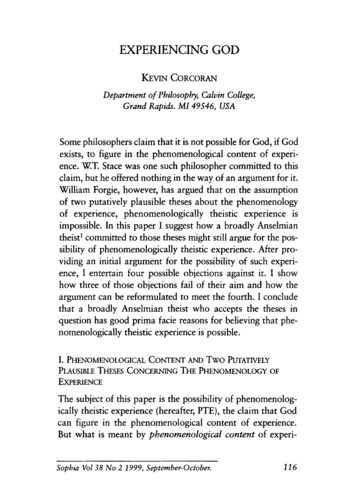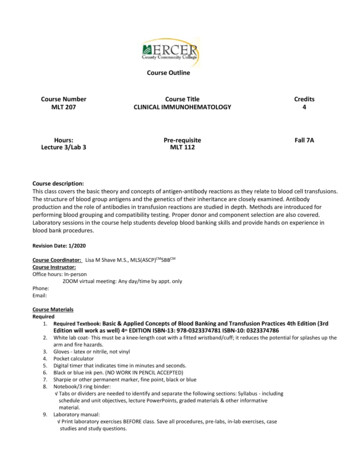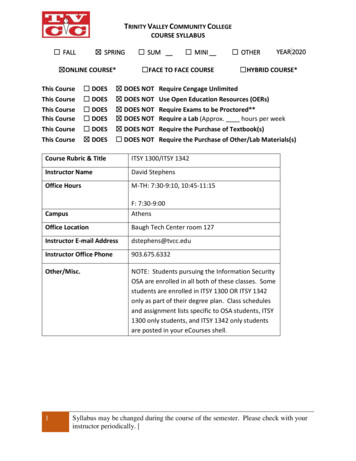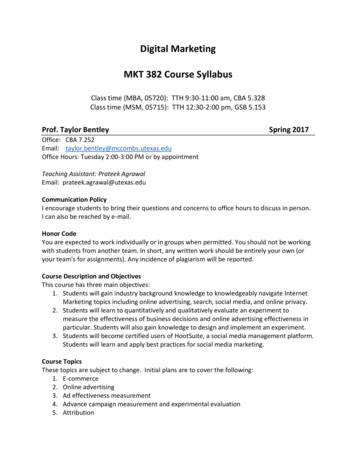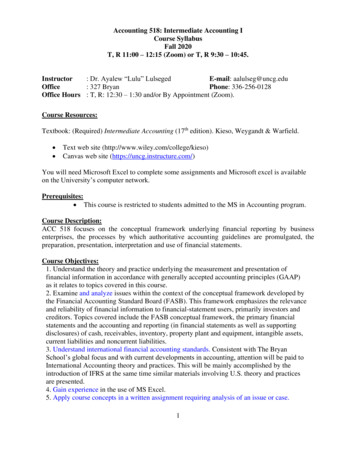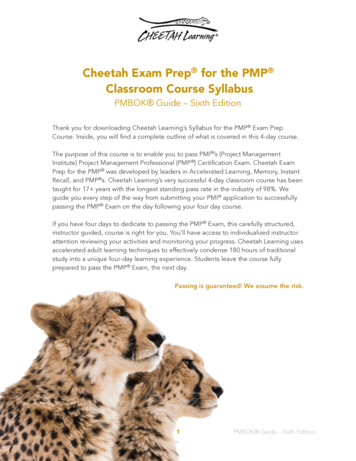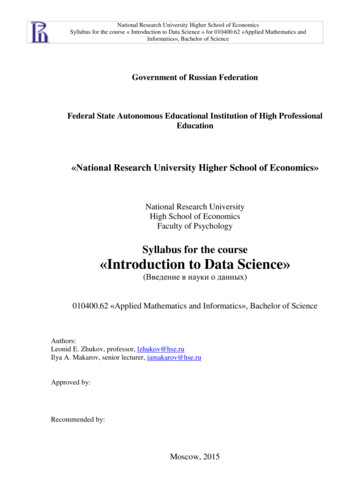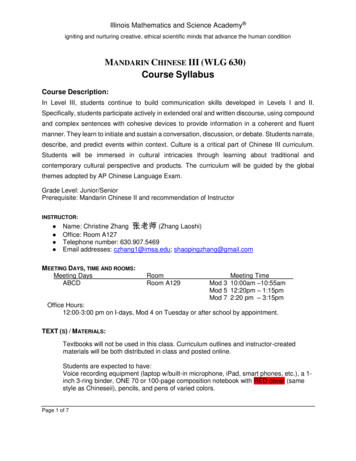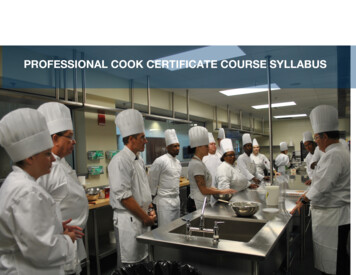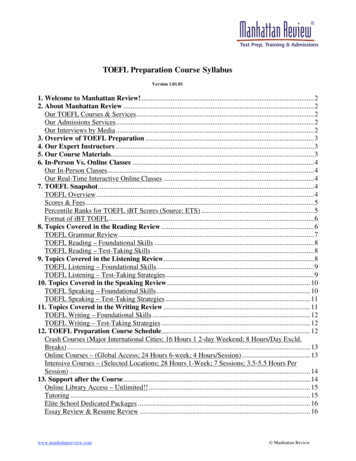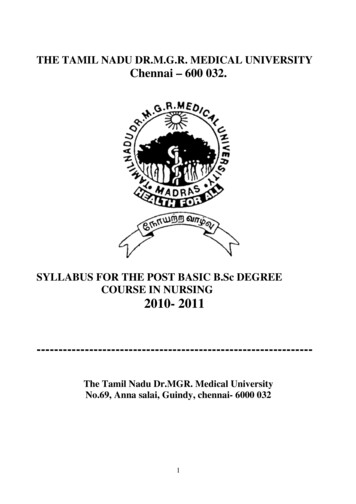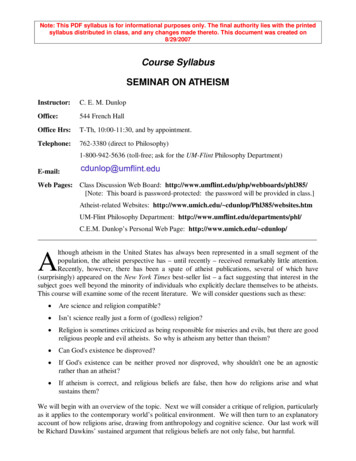
Transcription
Note: This PDF syllabus is for informational purposes only. The final authority lies with the printedsyllabus distributed in class, and any changes made thereto. This document was created on8/29/2007Course SyllabusSEMINAR ON ATHEISMInstructor:C. E. M. DunlopOffice:544 French HallOffice Hrs:T-Th, 10:00-11:30, and by appointment.Telephone:762-3380 (direct to Philosophy)1-800-942-5636 (toll-free; ask for the UM-Flint Philosophy Department)E-mail:Web Pages: Class Discussion Web Board: http://www.umflint.edu/php/webboards/phl385/[Note: This board is password-protected: the password will be provided in class.]Atheist-related Websites: http://www.umich.edu/ cdunlop/Phl385/websites.htmUM-Flint Philosophy Department: http://www.umflint.edu/departments/phl/C.E.M. Dunlop’s Personal Web Page: http://www.umich.edu/ cdunlop/lthough atheism in the United States has always been represented in a small segment of thepopulation, the atheist perspective has – until recently – received remarkably little attention.Recently, however, there has been a spate of atheist publications, several of which have(surprisingly) appeared on the New York Times best-seller list – a fact suggesting that interest in thesubject goes well beyond the minority of individuals who explicitly declare themselves to be atheists.This course will examine some of the recent literature. We will consider questions such as these:A Are science and religion compatible? Isn’t science really just a form of (godless) religion? Religion is sometimes criticized as being responsible for miseries and evils, but there are goodreligious people and evil atheists. So why is atheism any better than theism? Can God's existence be disproved? If God's existence can be neither proved nor disproved, why shouldn't one be an agnosticrather than an atheist? If atheism is correct, and religious beliefs are false, then how do religions arise and whatsustains them?We will begin with an overview of the topic. Next we will consider a critique of religion, particularlyas it applies to the contemporary world’s political environment. We will then turn to an explanatoryaccount of how religions arise, drawing from anthropology and cognitive science. Our last work willbe Richard Dawkins’ sustained argument that religious beliefs are not only false, but harmful.
Philosophy 385 / Fall 2007Page 2COURSE TEXTSJulian Baggini, Atheism: A Very Short IntroductionPascal Boyer, Religion Explained: The Evolutionary Origins of Religious ThoughtRichard Dawkins, The God DelusionSam Harris, The End of FaithEVALUATION CRITERIA1/3 Course Journal1/3 Class Participation1/3 Final PaperCOURSE JOURNALSExcept for the first seminar session (on 9/4/07) a journal entry is due each week. You mayskip two journal entries without penalty; alternatively, if you write all – or all but one – your lowestscore(s) will be dropped. Weekly journal entries will be collected randomly throughout the semester,and on the last day of class (12/4/07) your entire journal (including entries previously submitted) isdue. Please keep your journal entries in a loose-leaf binder so you can hand in a given week’s entrywithout having to submit the entire journal.How to proceed: Please single-space your journal entries to conserve paper. Each journalentry should adhere to the following format: (1) a one or two page summary of the reading. Thiswill provide a basic overview of the reading’s contents, and demonstrate that you are familiar withauthor’s overall position. (2) Answers to each of the study questions (one or two paragraphs each).(3) Critical reflections. These may address particular study questions, or they may raise other issues.A “critical” reflection does not necessarily imply that you reject what the author is saying; the goalrather is to show that you have thought about the material, not merely summarized it. You coulddemonstrate this by relating the author’s position to contemporary world events, or to other readings(either from the course or from independent discoveries). Obviously, if you disagree with the authoron some points, you should mention that, including the reasons for your disagreement.CLASS PARTICIPATIONGiven the seminar nature of this course, class discussion will be the norm. On most weeks,groups of students will lead the class discussion (see the next section for details), but everyoneshould be prepared each week to contribute. In addition, you are expected to contribute regularly(i.e., weekly) to the class web board, which will figure prominently into the class participationcomponent of your course grade.The web board is a very simple “no frills” site, but – unlike some others (e.g., Blackboard), itloads quickly and it is easy to navigate. The URL and password are listed on the first page of thissyllabus. Note that both are case-sensitive; do not use any capital letters.If you have any problems using the web board, please send me an e-mail right away.
Philosophy 385 / Fall 2007Page 3PANEL-LED DISCUSSIONSAt the first class meeting you will be assigned to a panel that will lead three discussionsthroughout the semester (panel configurations may be changed as the semester progresses). Thepanel’s job is not to make a presentation to a passive audience, but rather to engage the rest of theclass in serious discussion of the assigned readings. This may accomplished in a variety of ways,e.g., by (a) proposing a statement for discussion; (b) focusing on a specific passage for interpretationor commentary; (c) asking specific questions about the material; (d) mentioning a current event topicthat is relevant to the readings. Other techniques are limited only by your imagination. Feel free touse the provided study questions as a guide, but please do not limit yourselves to them; the primarypoint of each class meeting is to insure coverage of all the relevant material in a serious, probingfashion. Remember that this is a philosophy class; no author gets a free pass, and every serious claimis open to critical scrutiny and argument.FINAL PAPEROn the day of the scheduled final exam (December 18), a formal essay is due (15-20 pages,double-spaced).1 Its title will be either “The Case for Atheism” or “The Case Against Atheism”,depending on which viewpoint you wish to defend. This is intended as a position paper, but it mustbe based on reasoned argument – it is not merely an opinion piece. Moreover, your essay mustdemonstrably take account of all of the course readings and relevant class discussion (informal pagereferences to various readings should be liberally included). In short, whatever viewpoint you adopt,you must situate your argument in the context of the seminar’s material. You are free to bring inother considerations as well, provided that you also demonstrate a mastery of the semester’s work.Your essay will be evaluated on the quality of its argument and presentation, not on the particularviewpoint that you elect to defend.COURSE POLICIESLate papers will not be accepted under any circumstances; please hand in your assignmentson time. Printed copies of journal entries are due in class at the beginning of the class session (no email attachments). Since you are permitted to skip two journal entries without penalty, a couple ofmissed journal entries will not jeopardize your course grade.The class format will revolve around discussion, and class participation is expected.Moreover, this course requires a substantial amount of written work, with assignments due eachweek at the beginning of class. Consequently, faithful class attendance is essential. Irregularattendance will affect your grade adversely, and excessive absences may result in denial of credit forthe course. Please bear in mind that each class session represents an entire week of the semester; oneabsence, therefore, is the equivalent of two or three absences for classes meeting multiple times eachweek.1There will be no final exam in this course; the described essay will serve as a substitute.
Philosophy 385 / Fall 2007Page 4ASSIGNMENT SCHEDULE9/49/11Introduction to the course / Overview of Atheism. (No journal entry due this week)Read: Baggini, Chs. 1 – 2Study Questions Ch 1. (1) What is atheism, and how is it connected to (a) physicalism; (b) naturalism?(2) What is the point of Baggini’s Loch Ness monster example? Ch 2. (1) What is meant by the claim that “absence of evidence is not evidence ofabsence”, and how does Baggini respond to it? (2) What is the difference betweenatheism and agnosticism, and why does Baggini think that atheism is defensible despitethe fact that it makes a stronger claim? (3) How can atheists avoid being dogmaticwithout trading atheism for agnosticism? (4) Given that theistic explanations couldaccount for the world as we find it, why should atheistic explanations be preferred? (5)If atheism cannot be established with 100% certainty, why isn’t it just a matter of faith?Overview of Atheism – IIRead: Baggini, Chs. 3 – 7.Study Questions (note that these continue onto the next page) Ch 3. (1) How does Baggini argue that God cannot serve as a viable foundation formorality (make reference to both (a) the Euthyphro argument and (b) Ivan Karamazov’sclaim that “Without God anything is permitted”)? (2) How does the story of Abrahamillustrate the point that belief in God does not really simplify morality, or even provide abasis for morality? (3) Discuss Baggini’s account of three attempts to get ethics off theground without a religious foundation. Ch 4. (1) What does it mean for life to have a “meaning” or “purpose”, and why doesBaggini think that God cannot serve as a satisfactory source of a meaningful life? (2)How does Baggini argue that atheists are better positioned than theists to find lifemeaningful? (3) How does a distinction between pleasure and satisfaction figure into anaccount of a meaningful life? (4) Discuss the connection (or lack thereof) betweenimmortality and a meaningful existence. Ch 5. (1) How does Baggini respond to the claim that “atheists are too committed tothe value of rational explanation”? (2) In what way might historical atrocities be billedas making a “case against atheism”? And why does this argument ultimately fail? (3) Inwhat way could atheism itself take on the dangerous mantle of fundamentalism?
Philosophy 385 / Fall 2007 9/189/25Page 5Ch 6. (1) Baggini suggests that traditional arguments for God’s existence, while theydo not succeed as proofs, nevertheless can be used “to show that God’s existence isconsistent with reason and evidence”. How can this claim be reconciled with theauthor’s endorsement of naturalism and rationalism in previous chapters? (2) Thephilosopher Alvin Plantinga referred to a personal inner conviction as “a special sourceof knowledge”. What’s wrong with this view? (3) Baggini refuses to say that religiousbeliefs are irrational, “because there are no standards for judging these questions sharedby atheists and believers” (p. 104). Does this concede more to theists than Baggini waswilling to concede in earlier chapters?Religion and the Contemporary World StagePanel #1 Leads DiscussionRead: Harris, Chs. 1 – 2Study Questions Ch 1. (1) What does Harris find objectionable in religious moderation? (2) AlthoughHarris makes criticisms of specific religions in this chapter, his most important point isreflected in the chapter title. Explain. (3) Harris claims that “without death, theinfluence of faith-based religion would be unthinkable”. Why? (4) In footnote #18,Harris writes that “There may even be some credible evidence for reincarnation”. Doesthis undermine his frequent assertion that key religious doctrines are nonsense? Ch 2. (1) Explain how Harris’ analysis of the nature of belief leads to the conclusionthat “religious beliefs to be beliefs about the way the world is, must be as evidentiary inspirit as any other” (p 63). (2) Given that religious believers would presumablywelcome the discovery of scientific evidence that confirmed their beliefs, how arereligious beliefs different from any other beliefs (including scientific beliefs)? (3) GivenHarris’ critique of religious faith, what does he mean in saying that “the faithful can beexpected to believe just like their secular neighbors – which is to say, more or lessrationally – in their worldly affairs” (p. 68). (4) If, as Harris claims, our “‘freedom ofbelief’ if it exists, is minimal” (p. 71), then how can he expect to convert any reader tohis point of view?Religion and the Contemporary World Stage – IIPanel #2 Leads DiscussionRead: Harris, Chs. 3 – 4Study Questions Ch 3. (1) How did the Catholic Church manage to reconcile the sadism of theInquisition with the teachings of Jesus? (2) Since the Inquisition took place hundreds ofyears ago, what relevance does it have to a discussion of contemporary religion? (3)How did anti-Semitism manifest itself in early Christian beliefs? Ch 4. (1) Although Harris’ numerous quotes from the Koran amply demonstrate thatnon-Muslims are represented therein as “infidels”, there are very few passages in thissection that actually recommends violence against them. So how does Harris concludethat such passages contain “a link between Muslim faith and Muslim violence”? (2)Exactly what, according to Harris, is “the problem with Islam”? (3) Given thatChristian Biblical texts offer many visions of eternal bliss, why don’t Harris’ criticismsof Islam apply equally to Christianity? (4) Evaluate Harris’ response to Zakaria’s
Philosophy 385 / Fall 2007Page 6argument quoted on p. 148. (4) How does Harris propose to deal with “the problemwith Islam”?10/2Religion and the Contemporary World Stage – IIIPanel #3 Leads DiscussionRead: Harris, Chs. 5 – 7Study Questions10/9 Ch 5. (1) Many people might regard the infusion of faith into politics and law as a goodthing, but Harris is not among them. Why not? (2) What does religion have to do withwhat Harris regards as the United States’ misguided policies on drugs, stem cellresearch, and support of ove
The web board is a very simple “no frills” site, bu t – unlike some others (e.g., Blackboard), it loads quickly and it is easy to navigate. The URL and password are listed on the first page of this syllabus. Note that both are case-sensitive; do not use any capital letters.
